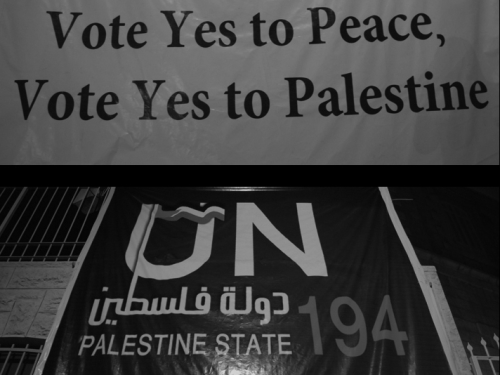
This article was originally published September 2015 by swisspeace.
On 23rd of April 2014, Fatah and Hamas signed in Gaza’s Shati refugee camp the latest of a series of reconciliation agreements. Hopes were not particularly high, as a number of similar agreements had been signed in the past (Sana’a 2008, Mecca Agreement of 2008, Cairo Agreement of 2011, and Doha Declaration of 2012) but were incapable of overcoming the factional divide in practice. The Shati agreement had the potential to be different. The parties indeed proceeded to form a Government of National Consensus (GNC) and thus gave proof of significant political will.
The challenges awaiting resolution by a unified Palestinian polity are indeed massive: the re-creation of a unified national political agenda and strategy for national independence; the re-establishment of the legitimacy and unity of key political institutions; the forming of a framework allowing a new generation of leaders to emerge, to only name a few. Such decisive issues for the future of the Palestinian national movement will unlikely be tackled if the parties fail to address the more immediate problems that have emerged as a direct consequence of eight years of separation and factional hostility: i.e. the control of the border crossings, re-unification of public administration and work force; re-unification of the justice system; security sector reform; compensation of the several hundred victims; Palestinian Liberation Organization (PLO) reform, etc.
Sixteen months after the Shati agreement and the creation of the GNC, however, it is difficult to stay optimistic. The GNC has remained a shadow of a government, unable to even fulfil the lowest expectations Palestinians could have had from it. Politicians from both Fatah and Hamas prefer to continue trading accusations over who is responsible for the continued deadlock instead of creating a format and channels for discussing the pressing problems. The plight of the population in Gaza has only worsened over time in the light of a stalled reconstruction process, unpaid salaries of tens of thousands of public service employees, and the persistent blockade. The perception of the population in Gaza is that their situation is hardly a priority for their brothers and sisters in the West Bank. This is a poisonous seed for the future of a unified national agenda.
International actors traditionally play a disproportionally large role in the Israeli-Palestinian conflict. However, relatively little has been done by influential actors such as the European Union or the United States to create an enabling environment that fosters reconciliation. Sixteen months after the signing of the Shati agreement, the misguided and counterproductive no-contact policy towards Hamas is still in place. It is difficult to imagine how Palestinians can move towards the establishment of a real Government of National Unity and elections, if it is not clear that key international players including the United Nations would accept such a change.
Also regarding direct support of a difficult reconciliation process, international actors have remained largely passive. There is a perception that most diplomatic actors – with the notable exceptions of Switzerland and the Office of the United Nations Special Coordinator for the Middle East Peace Process (UNSCO) – were extremely reluctant to invest sufficient political capital in order to overcome the blockages between the two parties.
The picture looks somewhat differently regarding the efforts of international non-governmental organisations (INGOs). There is a high level of on-going advocacy work targeting important factors conducive to reconciliation. For example lifting the Gaza blockade, increasing the accountability of the political leadership, strengthening the rule of law, or protecting the space for civil society action. However, more could have been done. While there would have been the opportunity to robustly incorporate reconciliation into on-going programmes, very few human rights, development, gender or democratisation programmes received an appropriate “reconciliation component”. This leaves reconciliation up until today under-researched and still largely neglected as a field of specific activity for INGOs and their Palestinian partner organisations and networks. The role of civil society is crucial given the current deadlock between the political parties. Furthermore, the factional split is not limited to the political realm, but affecting society at large. More space is therefore needed in Palestine for a broad-based discourse about what “social reconciliation” entails, what the expectations, contributions, and demands of the wider population are, etc. All of this calls for a proactive stance and an enhanced role of civil society organisations in this process.
The window of opportunity for Palestinian reconciliation is slowly closing. The effect of another failed reconciliation process will likely be quite drastic: it would not only cement the internal political and regional divisions, but create a dangerous political vacuum affecting the legitimacy of the Palestinian leadership as a whole. In such a case frustrations about continued division, occupation and dispossession could easily lead to larger-scale societal unrest and violence. The main responsibility for the current impasse clearly lies with the decision makers inside Fatah and Hamas as well as the presidency. However, more can and should be done by international actors as well.
Roland Dittli (roland.dittli@swisspeace.ch) is the Head of the Peacebuilding Analysis and Impact Programme at swisspeace. Additional materials on the Israeli-Palestinian conflict can be found at http://www.swisspeace.ch/countries/israelpalestine.html

This work is licensed under a Creative Commons Attribution-NonCommercial-NoDerivatives 4.0 International License.
For more information on issues and events that shape our world, please visit ISN Security Watch or browse our resources.

